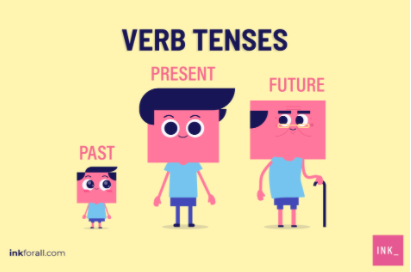
Simple Verb Tenses

Overview
Students will be able to learn about verb tenses by watching instructional videos on the definition of verb tenses and how they are used in sentences. Finally, students will be able to check their knowledge of verbs through games and online quizzes and apply their knowledge in their own writing.
Learning Objectives
Students will:
- Understand the definition of verbs.
- Understand the use of verb tense in a sentence.
- Apply their knowledge in their own writing.
Vocabulary
Vocabulary Words:
- Verb: A verb is any member of a class of words that function as the main elements of predicates, that typically express action, state, or a relation between two things, and that may be inflected for tense, aspect, voice, mood, and to show agreement with their subject or object.
- Past: (n) The past is the time gone by.
- Present: (n) The present is the present, or current, time.
- Future: (n) The future is a time that is to be or come hereafter.
Pre-planning
To prepare for this lesson:
-
Watch the videos:
-
Play the following games:
-
Word Search independent games
-
Two-player/multi-player games: Ninja Fighting Game, and Multiplayer Basketball Game
-
Print Verb Tense worksheet.
-
Do evaluations to determine which level and type you want to use:
Accommodations
See Accommodations Page and Charts on the 21things4students.net site in the Teacher Resources.
Steps
Directions for this activity:
-
Introduction: Have students watch the videos:
-
Then have them apply their knowledge by playing games, doing assessments, and writing.
-
Activity: Allow them to practice their learning by playing several games:
-
Word Search independent games.
-
Two-player/multi-player games: Ninja Fighting Game, and Multiplayer Basketball Game
Assessment Options
Different options for assessing the students:
- Observations
- Check for understanding
- Complete Verb Tense worksheet after practicing with games.
- Do evaluations to determine which level and type you want to use:
- Students can choose a book and underline the verbs in each sentence (copy pages first). If a chapter book, they can choose one page, picture books, several pages.
MITECS Competencies & ISTE STANDARDS
MITECS: Michigan adopted the "ISTE Standards for Students" called MITECS (Michigan Integrated Technology Competencies for Students) in 2018.
Empowered Learner
1c. Students use technology to seek feedback that informs and improves their practice and to demonstrate their learning in a variety of ways.
Creative Communicator
6c. Students communicate complex ideas clearly and effectively by creating or using a variety of digital objects such as visualizations, models or simulations.
6d.Students publish or present content that customizes the message and medium for their intended audiences.
Devices and Resources
Device: PC, Chromebook, Mac, iPad
Browser: Chrome, Safari, Firefox, Edge, ALL
App, Extension, or Add-on:
Websites:
Verbs: Part 3: Present, Past, and Future Tense
Word Search Independent games
CONTENT AREA RESOURCES
ELA
- Students watch videos that combine words and songs/speech.
- Students read directions for games and follow along to successfully pass levels and compete.
- Students choose a page from a book of their choice and highlight all of the verbs on the page. Then they label the verbs with their proper tense: past, present, future. Are there any patterns?
- Students can liven up their verbs with input from peers or teachers.
- Read a Jules Verne novel and discuss how his predictions of technology came to fruition.
Integrated Arts
- Do a time-lapse video of action over time: growing seed, shadows, decaying fruit, etc., and post it to the class site. Allow students to predict what will happen in the future.
- Choose a social study activity from above and create a way to show others: infographic, slideshow, or video.
Math
- Students use games to foster math skills.
- Understanding timelines and the movement of coordinates to different planes - just like time moves between past, present, and future.
- Learn Roman numerals and apply them to current situations (Superbowl, online games, etc.).
- Learn about the evolution of computers - what they could do, how much space they occupied, and predict what they will be in the future.
Science
- Create or do an experiment that shows the element of change. For example, past=seed, present=plant, future=fruit.
- Show the process of erosion with photos from a specific location and how it has changed over time (fields, Lake Michigan shoreline, glaciers, etc). Predict/hypothesize what it will be in the future.
- Divide the class into three groups and do research about discoveries - past discoveries (gravity, radiation, etc.); present discoveries (vaccines, space exploration, etc.), and future discoveries (cure for cancer, time travel, etc.).
Social Studies
- Learn about the history of your city.
- Ask an expert: Talk to someone at the local park or township to find out future projects in the works.
- Discover your own history and family genealogy at Family History Search with Historical Records - SuperSearch - MyHeritage (myheritagelibraryedition.com).
CREDITS
This task card was created by Caryn Parker, Gull Lake Virtual Partnership, January 2021.


